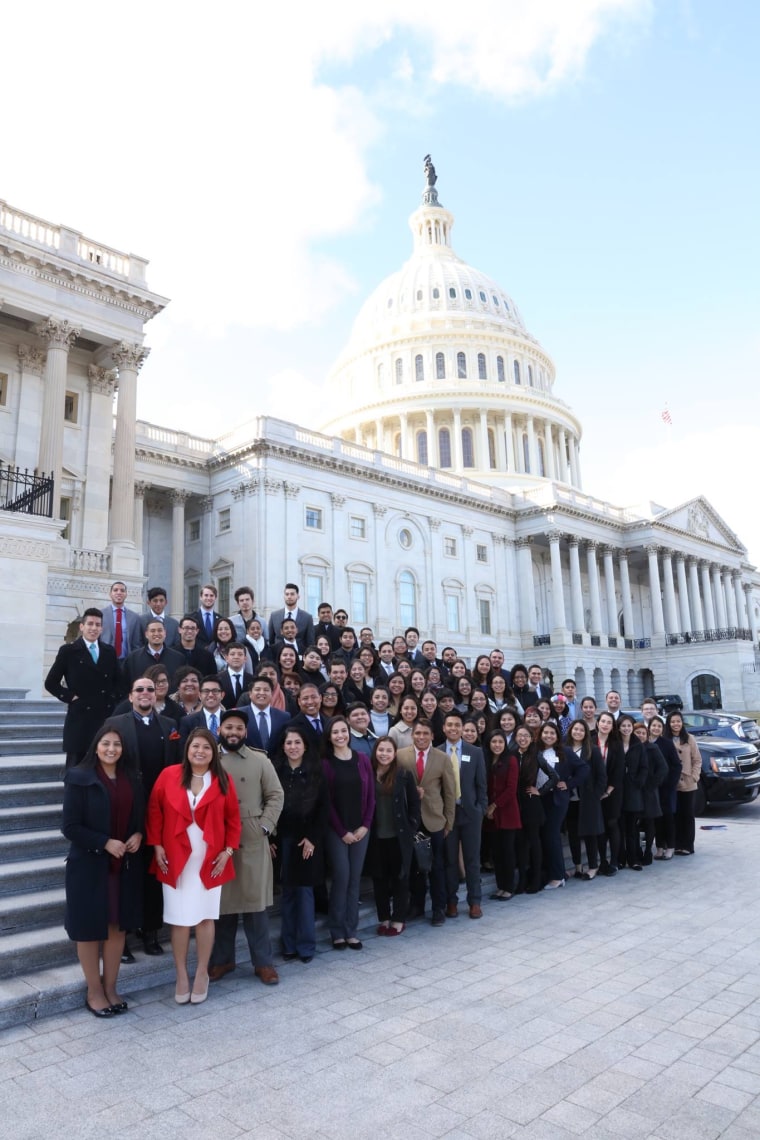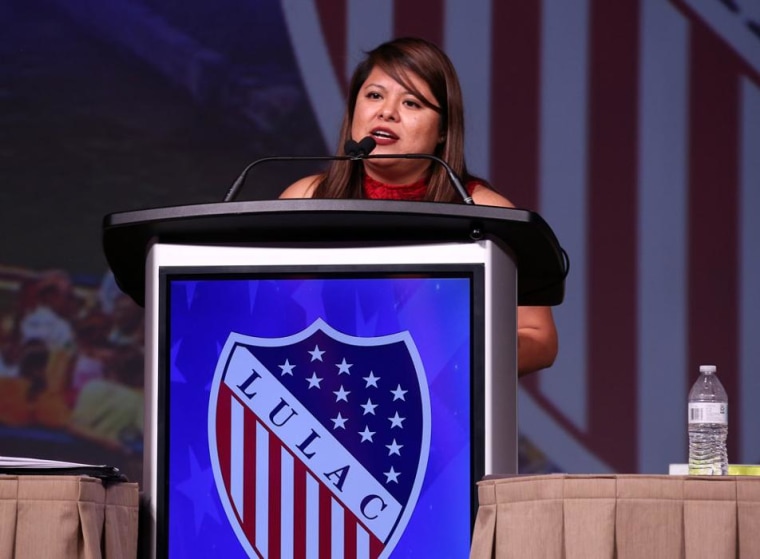WASHINGTON —The nation’s oldest Latino civil rights organization didn’t just push its president to resign while standing up for its immigration principles last week. It saved itself from extinction.
Facing a graying membership, the League of United Latin American Citizens has ramped up efforts to attract younger members. That has included adopting the younger Latinos' progressive views on immigration, which LULAC has made central to its agenda.
But LULAC President Roger Rocha Jr. put that work and the organization in jeopardy when he sent a Jan. 28 letter to President Donald Trump saying LULAC could support Trump’s immigration plan to trade legalization of 1.8 million immigrants for hardened enforcement and slashed legal immigration.
“There’s no question LULAC was at risk of losing its future,” said Darryl Morin, a LULAC member and its former vice president for the Midwest. “We are here advocating for approximately 700,000 DACA recipients, but in total, about 2 million Dreamers, and to abandon them would have been unconscionable.”
Abigail Zapote, LULAC’s national vice president for young adults, was more blunt.
“If our organization hadn’t stood up and said anything, our organization at that time would have died,” Zapote told NBC News.

LULAC felt the power of its younger members — many who learned at least some of their advocacy through the organization — and witnessed their ability to mobilize when Rocha’s letter became public.
In a single day, some 150 young members quickly assembled in a Facebook chat, Zapote said. They made decisions on how they would denounce Rocha’s letter on social media and figured out what to do “when hate is penetrating our own organization,” she said.
Rocha has since apologized for the letter, calling it the “worst mistake of my life.” That apology came after a stampede of criticism, demands for his resignation and lots of backlash through the Twitter hashtag, #FueraRocha.
“Knowing they (young LULAC members) were able to do it with their own organization at stake, it was just beautiful,” she said.
The saga unfolded as LULAC was preparing for its fifth gathering of young leaders of Latino groups, not all LULAC, from campuses around the country. Zapote said that added pressure to do a quick separation of the 89-year-old organization from Rocha and his letter.
The 150 students chosen to attend the Feb. 14 event, the fifth LULAC has staged, will hash out policy priorities and then head to Capitol Hill to lobby Congress on their issues.
They will be in the nation's capital as the Senate debates immigration, after the House halted another government shutdown by passing a spending bill that excluded legislation for Dreamers.
Many of the participants in previous EMERGE conferences were Dreamers who shared their personal stories on the Hill to get legislation giving them a path to citizenship and to fight measures that they describe as terrorizing their families.
“It would be like LULAC was lying to the kids,” had it not denounced Rocha’s letter, said Zapote, a legal permanent resident who was undocumented when she joined LULAC in 2011.
Youth defines Latinos
The ignore-at-your-peril reality for LULAC is that Latinos are the youngest major racial or ethnic group in the country.
About one-third or 18.3 million Latinos are younger than 18 and about three-in-10, or 16.6 million are millennials, according to Pew Research Center’s analysis of the 2016 American Community Survey.
On top of that, young Latinos are strongly pro-immgrant.
A GenForward survey of millennials found Latino millennials had the highest support among all racial groups for creating a path to citizenship for law-abiding immigrants and for immigrants who entered the U.S. illegally with their parents as children or overstayed visas.
They were least supportive of various immigration enforcement measures, including building a wall.
Even though the majority of Latino youth are U.S. born, about half of Latino millennials worry a family member, close friend or they themselves could be deported, according to the GenForward survey.
Several LULAC young members are Dreamers, and among those some have had protection from deportation and work permits through the Deferred Action for Childhood Arrivals program, DACA.
The young members weren’t alone in pressing for Rocha’s resignation. Calls came out early from a local California LULAC council and from the state council. A cascade of resignation demands followed. Older LULAC members backed their younger members.
Joe Enriquez Henry, national vice president of the Midwest, said of the 35 voting members of the board, the majority have received letters from LULAC state directors asking Rocha to step down, including from the director in his home state, Texas. Henry said they have received no letters asking for Rocha to remain as president.
A shift on immigration
Advocating for legalization of immigrants has been a shift for LULAC. When it formed to fight racism against Mexican Americans in 1929, LULAC was careful to adopt the American flag and other patriotic symbols to dispel any notions that it was a seditious group.
And through the years, it has been a more conservative to moderate group, reflective of its membership.
Critics often point out that it fought the Bracero program that brought farm workers from Mexico to the U.S. and that it supported “Operation Wetback,” the deportation operation of the Eisenhower administration.
But in the current debate over immigration, LULAC has taken positions that are squarely with progressive immigration advocacy groups and young Latinos.
“In the early years we weren’t as open to immigrants and that certainly has changed,” said Brent Wilkes, LULAC's CEO. “We fight on behalf of documented and undocumented.”
Not all agree with the LULAC national platform. In the fight over Rocha’s letter to Trump, Baldomero Garza, the director of LULAC District 18 in Houston, sent an email to some members defending Rocha.
“LULAC has taken the position to forget the other 44 million Hispanics in our country to advocate for Dreamers,” Garza said in an email.
“Dreamers are foreign citizens in our country. They have taken advantage of our benefits, benefits meant for American citizens,” he said.
But LULAC’s opposition to a border wall, support for veterans who have been deported, support for Dreamers and other immigration-related positions are dictated by resolutions voted on and approved by the group's National Assembly, which is made up of council delegates who attend LULAC's annual conference.
A new way of doing business
As it has tried to become more attractive to young people, LULAC also has done away with some old ways of conducting business, which it saw as a turnoff to younger potential members.
Until 2015, when LULAC adopted electronic, secret ballot voting, delegates had to stand up at national conferences and publicly state how they were voting, making voting delegates vulnerable to pressure and influence.
There were other recommendations for reforms from a governance study LULAC commissioned, but they were put on hold during Rocha’s tenure, said Morin, the Wisconsin past national vice president of the Midwest.
“Without the governance reforms, it’s easy for people to work outside established policies and practices and that will lead to significant challenges, as demonstrated by current circumstances,” Morin said.
In their statement condemning Rocha, LULAC Young Adults committed to repairing the harm they said Rocha caused and pledged to double their commitments and actions “to show the broader community LULAC does not appease or abet those who would threaten or exploit Latinos or immigrants for political ends.”
In other words, despite Rocha's actions and because the group has demanded he resigne, the organization's youth said they are recommitting to LULAC's original mandate.
“How do you make sure you continue being the oldest and largest Latino civil rights organization in the country?” Wilkes asked. “We have to continually renew the membership and have young people coming in.”
